eCommerce has become an essential part of business operations in today’s digital age. With an increasing number of businesses moving online, the need for reliable eCommerce platforms has become more important than ever before. Shopify and Volusion are two popular eCommerce platforms that offer a wide range of features and functionality to help businesses build and grow their online stores. While both platforms offer similar basic features, they have unique differences in terms of pricing, design, payment processing, customer support, and more. In this article, we compare Shopify vs Volusion in detail, highlighting the features of each platform to help you make an informed decision about which one is best suited for your business.
Table of Contents
Shopify vs Volusion: Overview
Shopify
Shopify is a popular eCommerce platform that allows individuals and businesses to create online stores and sell products or services. The platform provides a wide range of tools and features to help users design, launch, and manage their online stores with ease.
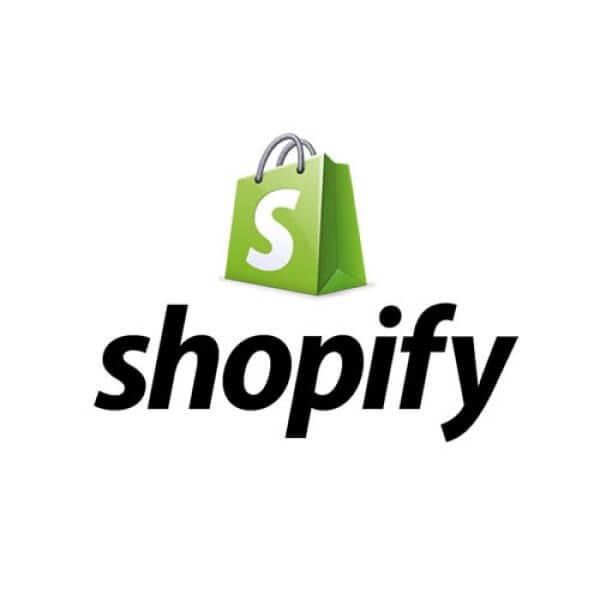
Shopify was launched in 2006 and has since become one of the most popular eCommerce platforms in the world, serving over 1.7 million businesses in more than 175 countries. The platform is known for its user-friendly interface, customizable templates, and extensive range of third-party integrations and apps.
Shopify offers a variety of pricing plans to suit different business needs, ranging from basic plans for new businesses to more advanced plans for established businesses with higher sales volumes. The platform provides a range of features, including product management, payment processing, shipping and fulfillment, marketing tools, analytics, and customer management.
Volusion
Volusion is an eCommerce platform that enables businesses and individuals to create and manage online stores. Founded in 1999, it is one of the earliest eCommerce platforms and serves over 30,000 businesses worldwide.
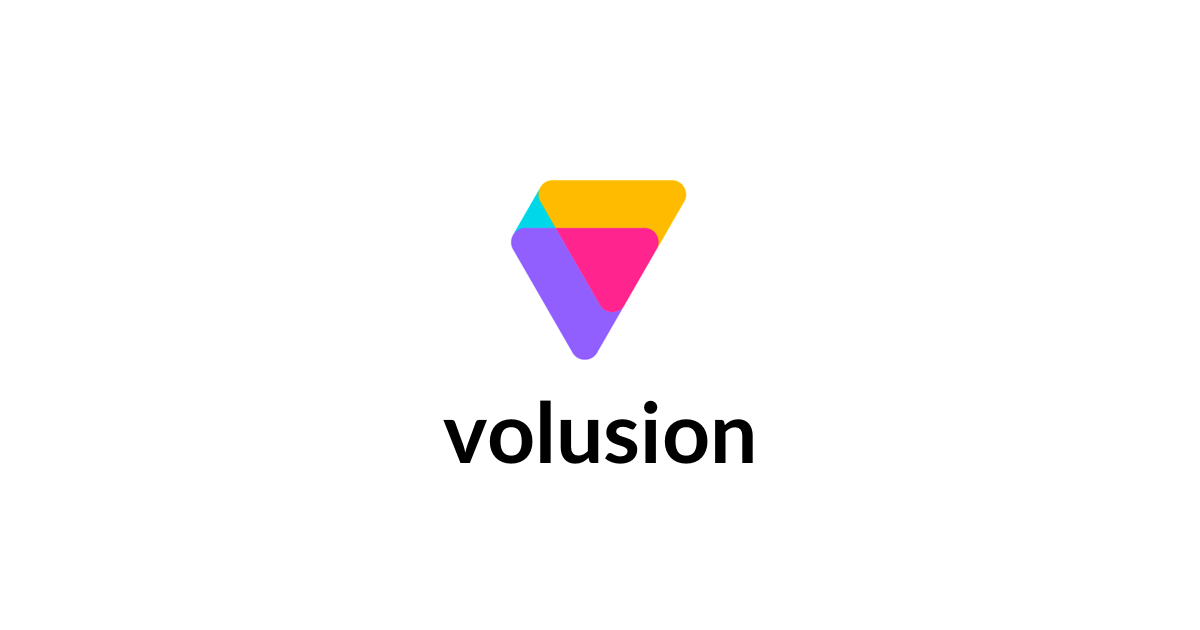
Volusion offers a variety of features, including product management, payment processing, shipping, and marketing tools. This platform also provides a range of customizable templates and themes to help users create and design their online stores.
One of the key features of Volusion is its drag-and-drop website builder, which makes it easy for users to create and customize their online stores without any coding knowledge. The platform also provides a built-in blog, social media integrations, and SEO tools to help businesses increase their online visibility and reach a wider audience.
Shopify vs Volusion: Comparison
Ease of Use
Considering the ease of use between Shopify vs Volusion, each platform is well-known for its user-friendliness. Shopify’s backend is uncluttered and easy to navigate, with various modules and segments to explore. Adding products to the system and installing Shopify apps is a quick process. Additionally, users can create custom discounts for specific purchases.
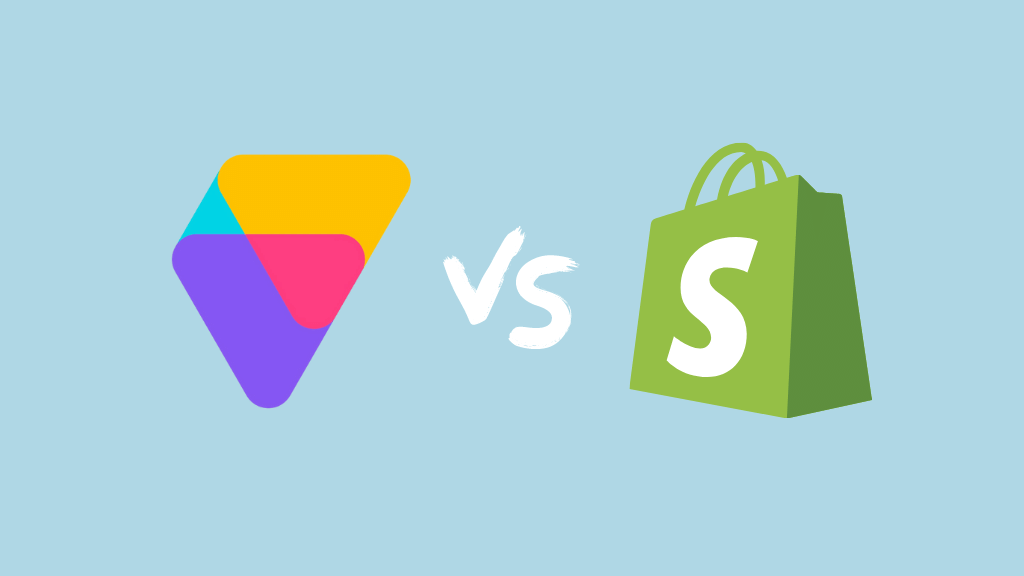
Likewise, Volusion offers a straightforward backend with a 99.9% uptime and user-friendly features. The platform emphasizes ease of use, with drag-and-drop components and colorful icons that make it easy to navigate.
If you’re a beginner with eCommerce websites, Volusion may be more appealing, as it guides users through every step of the setup process. However, some experienced eCommerce users may find the hand-holding aspect of Volusion condescending, as it can slow down the process for those already familiar with eCommerce software.
Product Management
Shopify offers a comprehensive product management system that allows users to create and manage their products easily. The platform provides various product attributes, including price, variants, and inventory management. Shopify also offers a bulk import/export feature that allows users to upload and download their product data in CSV format, making it easy to manage large inventories. Additionally, Shopify offers integrations with third-party apps, including dropshipping apps and product sourcing tools, that can help users manage their products more efficiently.

Like Shopify, Volusion offers a range of product management features, including product attributes, pricing, and inventory management. Volusion also provides a bulk import/export feature that allows users to upload and download product data in CSV format. Additionally, Volusion provides a built-in product comparison feature that enables users to compare products side-by-side, making it easy for customers to find the right product for their needs.
Shopify vs Volusion offers similar product management features, including product attributes, pricing, and inventory management. However, Shopify may have a slight advantage in this area due to its more extensive range of third-party app integrations, which can help users manage their products more efficiently. Ultimately, the choice between Shopify and Volusion will depend on the user’s specific needs and preferences.
Payment and shipping options
- Payment Options
Shopify provides a wide range of payment options for users, including Shopify Payments, which allows users to accept credit card payments directly on their site, as well as over 100 third-party payment gateways, including PayPal, Stripe, and Amazon Pay. Shopify also supports over 100 currencies, making it easy for users to sell globally.
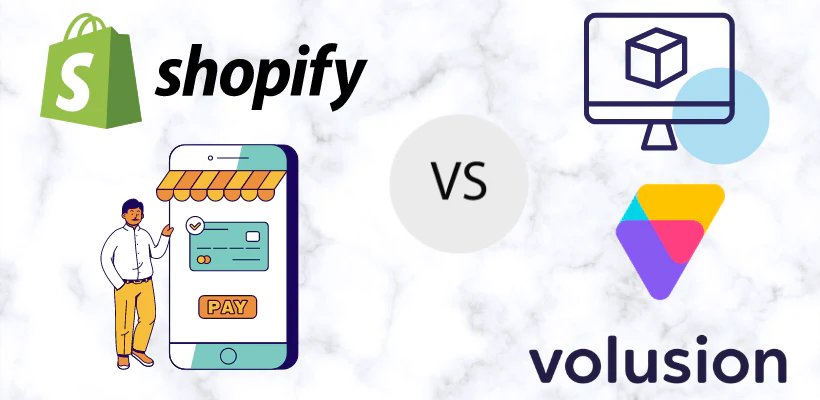
Volusion offers similar payment options to Shopify, including support for over 30 payment gateways, including PayPal, Stripe, and Authorize.Net. However, unlike Shopify, Volusion does not offer a built-in payment gateway.
- Shipping Options
Shopify offers a range of shipping options, including built-in shipping calculators that allow users to set shipping rates based on weight, destination, and other factors. Shopify also offers integrations with leading shipping carriers, including UPS, FedEx, and USPS, allowing users to generate shipping labels and track shipments directly from their Shopify account.
Volusion offers similar shipping options to Shopify, including built-in shipping calculators and integrations with leading shipping carriers like UPS and FedEx. However, unlike Shopify, Volusion does not offer a built-in label printing feature.
In general, Shopify vs Volusion offers similar payment and shipping options, with Shopify providing more extensive payment gateway support and built-in label printing features.
Design and Templates
Let’s examine the types of websites that can be created with Volusion and Shopify. In terms of web design, Shopify is often the preferred option due to its extensive customization options, which do not require advanced coding skills, and a variety of visually appealing templates.
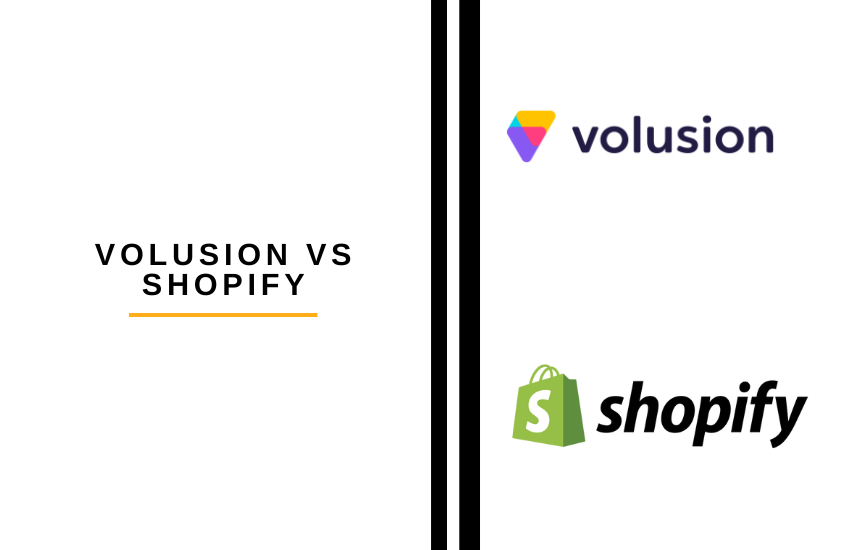
What makes Shopify particularly appealing is that the templates and themes offered on the platform are simple to implement and customize. The drag-and-drop editor, which is WYSIWYG, allows users to alter their website’s appearance without any coding knowledge.
In contrast, Volusion has a limited selection of themes, with only a few options available.
One advantage of Volusion is that the available themes can be modified using CSS and have a polished appearance. The platform’s WYSIWYG content editor allows for direct content editing on the site, but it may not offer as much flexibility as Shopify without requiring code.
Although Shopify has a lot to offer for website creation and customization, it is the ideal choice for beginners seeking a practical approach to designing a custom website.
Both Volusion and Shopify provide responsive templates for mobile devices, and all templates meet high professional standards. Whether opting for a free or paid theme, users can find an option that showcases their business’s unique style and professionalism.
Help & Support
While some companies may expect you to handle everything on your own, others offer reassuring customer support. Fortunately, both Volusion and Shopify are notable for their customer support.

Shopify provides various channels of customer support, such as 24/7 phone help, live chat, social media, and email guidance. With the Plus plan, you also get a dedicated agent to assist you.
Volusion also offers phone support, but only during specific hours. They do not provide email guidance, as they believe that phone support is the most effective way to provide a strong customer service experience.
Overall, Shopify offers a better customer service experience, particularly on higher-priced tiers, due to its range of customer support options. While Volusion is also easy to contact for assistance, it doesn’t quite match the level of support provided by Shopify.
SEO & Marketing
Both Shopify and Volusion offer a range of features to help businesses with SEO and marketing, but there are some differences to consider.
- SEO
Shopify has a built-in blogging platform and offers a wide range of SEO tools to help businesses optimize their content, including meta descriptions, alt tags, and customizable URLs. Shopify also offers social media integration and email marketing campaigns to help businesses reach their target audience.

Volusion offers similar SEO features, including customizable URLs, meta descriptions, and the ability to add alt tags to images. However, Volusion’s blogging platform is not as robust as Shopify’s, and it doesn’t offer built-in email marketing or social media integration.
- Marketing
Shopify offers a wide range of options, including social media integration, email marketing campaigns, and discounts and promo codes. Shopify also offers a variety of apps and integrations to help businesses with marketing, such as Google Analytics and Facebook Pixel.
Volusion also offers marketing tools such as discounts and promo codes, but it doesn’t have the same level of integration with social media or email marketing that Shopify does. Additionally, Volusion doesn’t have as many third-party integrations available as Shopify.

When comparing Shopify vs Volusion about SEO and marketing, both platforms offer great options. However, Shopify’s robust blogging platform and extensive integrations with third-party apps make it a better choice for businesses looking to optimize their content and reach a wider audience.
Apps & Integrations
Shopify vs Volusion offers a wide range of apps and integrations that can help merchants enhance their online stores. Shopify has a larger app store, with over 6,000 apps, while Volusion offers around 70 integrations. However, both platforms have the essentials covered, such as integrations with social media platforms, email marketing services, and shipping carriers.
Shopify’s app store has a larger selection of marketing and SEO apps, which can help businesses drive more traffic to their site and increase sales. Volusion, on the other hand, has a smaller app store but provides a few high-quality apps that focus on email marketing and automation.

Both platforms offer integrations with popular payment gateways, including PayPal and Stripe, as well as accounting software like QuickBooks and Xero. Shopify also has more integrations with dropshipping platforms such as Oberlo, Spocket, and Modalyst, which can be useful for businesses that don’t want to handle their own inventory.
In short, Shopify has a more extensive selection of apps and integrations, which can help businesses of all sizes scale their online stores. However, if a merchant only requires basic integrations, Volusion may suffice.
POS
It’s possible that you may want to connect your online store with physical retail locations like pop-up shops or mini-sales outlets. Thankfully, both Shopify and Volusion offer Point of Sale (POS) solutions for such scenarios.
Shopify enables you to purchase POS hardware like barcode scanners, tills, receipt printers, and more, to build your POS system. You can also sync your inventory data with your backend to keep track of your inventory status. You can use your POS checkout on any Shopify plan, but to access advanced features like staff pins, registration, and multiple sales locations, you need to be on the Shopify plan or higher.

Volusion also provides POS functionality, allowing you to use a variety of UPC scanners, receipt printers, and card readers to build your POS system as per your preference. While inventory information is synced in real-time, you may need to adjust configuration settings on Volusion.
Dropshipping
Both Shopify and Volusion offer features for dropshipping, but Shopify may be the better option for those looking to start a dropshipping business.
Shopify has a built-in dropshipping app called Oberlo that allows you to easily import products from AliExpress and other suppliers into your Shopify store. This app also helps with order fulfillment, tracking, and inventory management. Additionally, Shopify has a wider range of third-party apps and integrations that can help with dropshipping, such as Spocket and Printful.
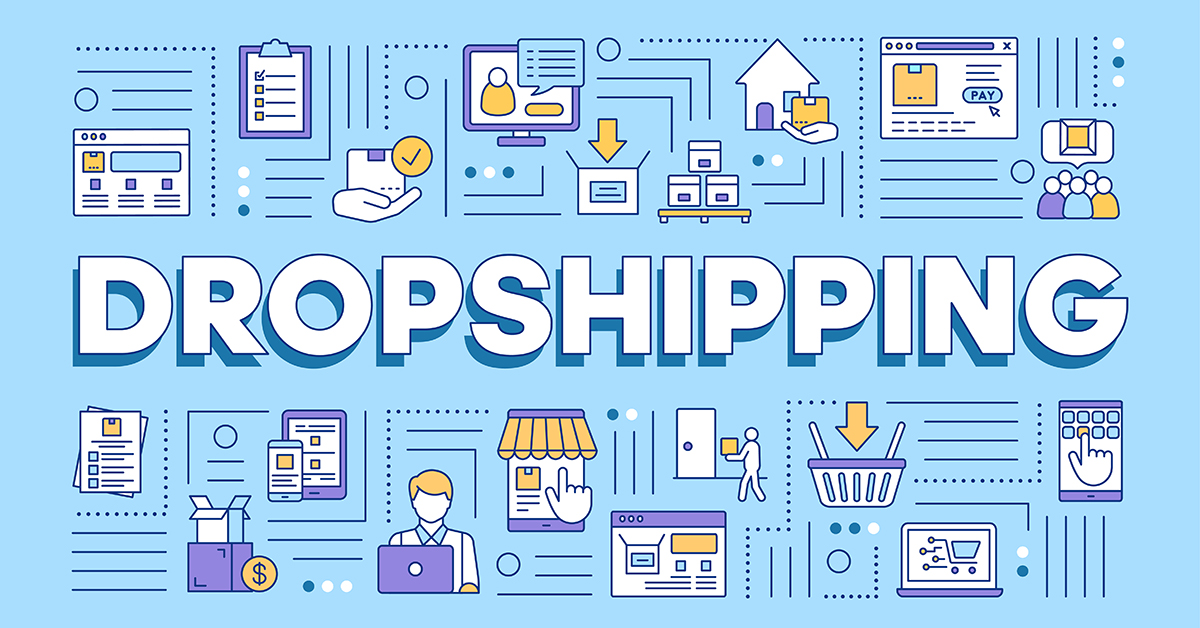
Volusion also has a built-in drop shipping feature that allows you to connect with suppliers and manage inventory, but it is not as robust as Shopify’s offerings. Volusion’s dropshipping feature also requires a higher-level plan, which may be a drawback for those on a budget.
Shopify may be the better choice for dropshipping due to its built-in app and a wider range of third-party options. However, it’s worth noting that both platforms have tools that can help you start and manage a successful dropshipping business.
Security
Shopify and Volusion both prioritize security and offer several features to ensure that your eCommerce store is secure.
Shopify provides a secure hosting environment with 24/7 monitoring and daily backups. The platform is Level 1 PCI compliant and supports SSL encryption for all websites. Shopify also offers two-factor authentication to protect against unauthorized access to your account.

Volusion also provides a secure hosting environment and is also Level 1 PCI compliant. The platform supports SSL encryption and has 24/7 monitoring to detect any potential threats. Additionally, Volusion provides a security scanning tool that checks for vulnerabilities in your website and provides recommendations on how to improve security.
Shopify and Volusion take security seriously and provide several features to ensure the security of your eCommerce store. However, Shopify’s additional features such as two-factor authentication and daily backups make it slightly more secure than Volusion.
Pricing
- Shopify
Shopify offers multiple plans that cater to different needs and budgets. The three main plans are Basic Shopify, Shopify, and Advanced Shopify, which allow you to create your own online store.
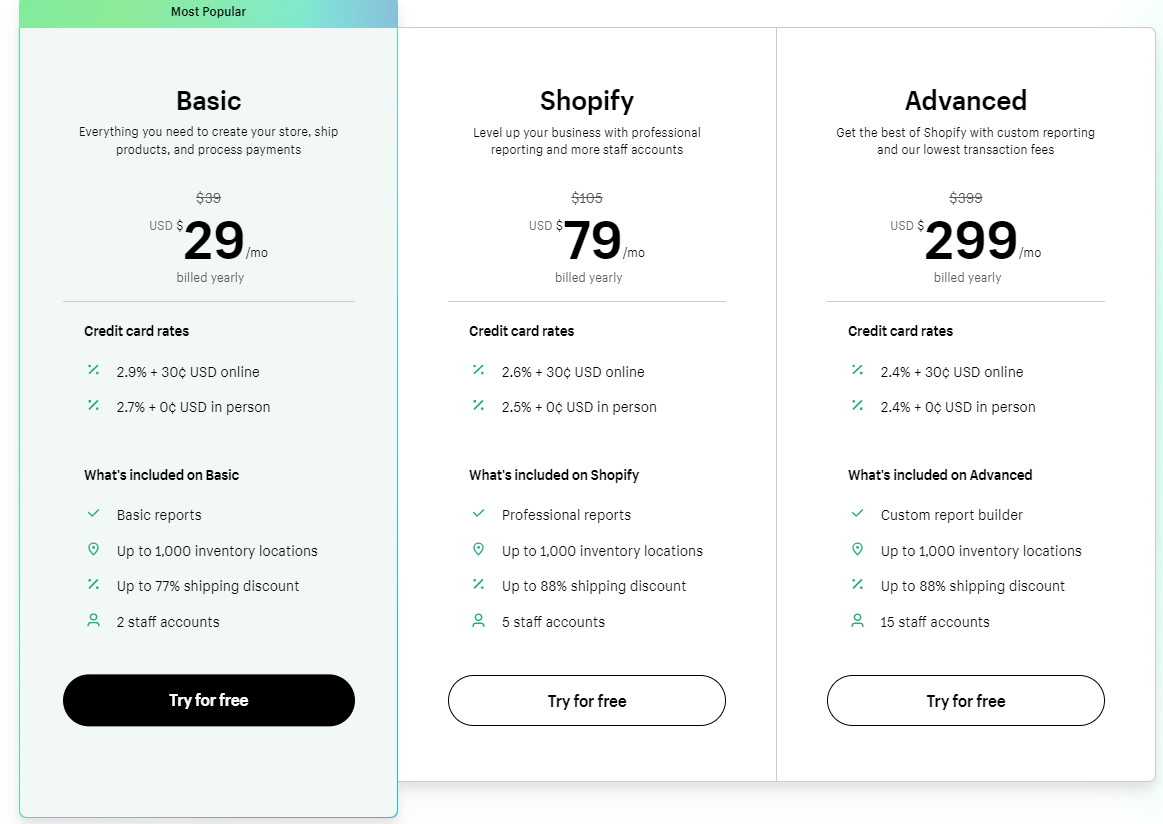
All plans include unlimited products, abandoned cart recovery, multichannel integration, and discount code creation.
- Volusion
Volusion also offers four different pricing plans, with monthly costs ranging from $35 to $299.
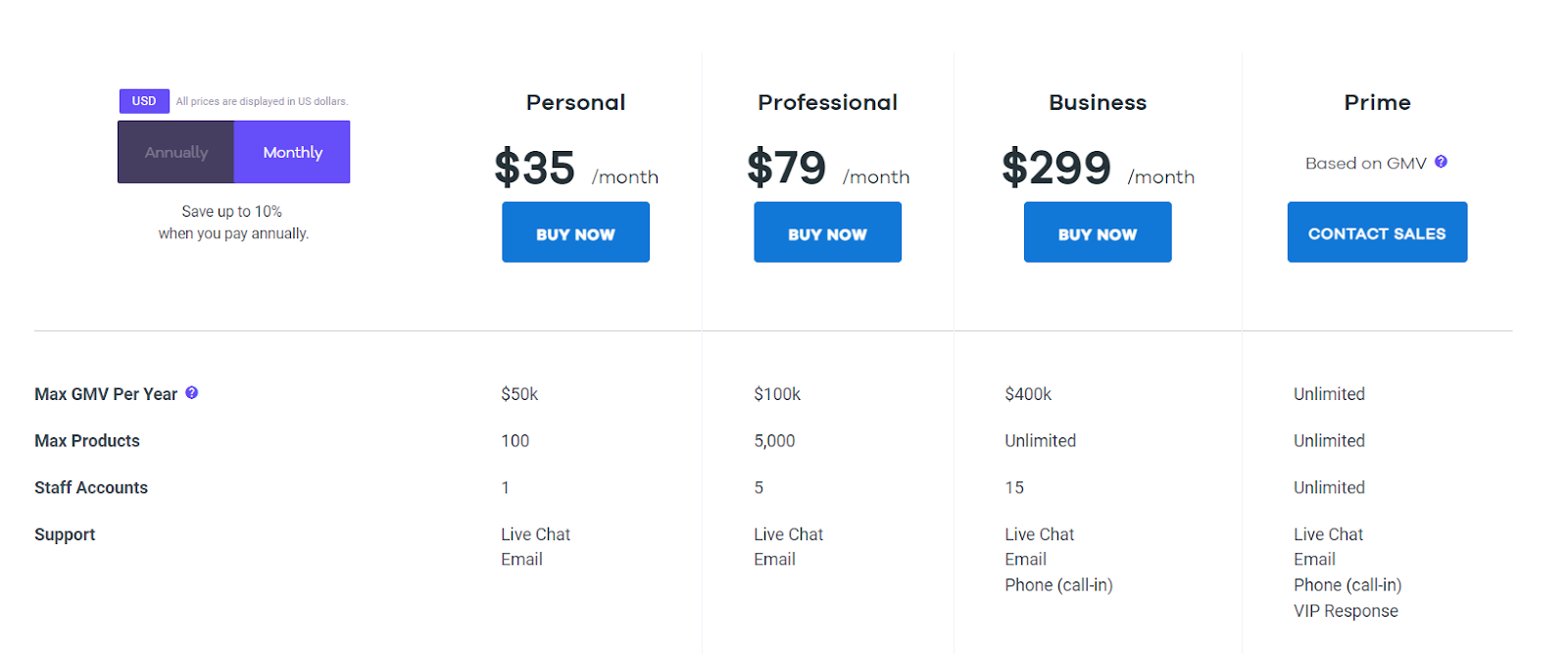
Shopify and Volusion offer different pricing plans to suit the needs of businesses of various sizes and stages.
Volusion Prime vs Shopify Plus
Shopify Plus is the enterprise-level version of the Shopify platform and is designed to handle high-volume merchants and large businesses with complex needs. Shopify Plus offers unlimited sales volume and product listings without any restrictions. Additionally, it can handle up to 500,000 hits per minute, which provides a high level of scalability. Unlike some other platforms, Shopify Plus doesn’t increase its monthly fees once customers exceed a specific number of orders.
Volusion’s highest custom pricing tier is referred to as Volusion Prime. This edition offers third-party gateways, advanced report builders, batch order processing, and API access. It also has advanced inventory management options, phone order support, and built-in SEO tools. Volusion Prime allows you to leverage ratings and reviews, social media buttons, Amazon and eBay integrations, and abandoned cart reports. Additionally, the platform provides CRM technology and comes with the highest level of VIP support from Volusion, similar to Shopify Plus.
Shopify Plus and Volusion Prime are designed for big businesses and can be tailored to your specific requirements. Shopify Plus offers more premium features than Volusion Prime, such as blogging and recurring payment settings, as well as options for upselling and cross-selling. While Volusion does offer high-tier packages, it doesn’t include these advanced features, making Shopify Plus the better option for those looking for the most comprehensive solution.
Which eCommerce platform is better?
Where Shopify is better
After comparing Shopify vs Volusion, it’s clear that Shopify is better in several areas.
Firstly, Shopify provides a more user-friendly interface, with a cleaner and easier-to-use backend. The drag-and-drop website builder and WYSIWYG editor make it simple for beginners to design their websites without any coding knowledge. In contrast, while Volusion’s backend is also user-friendly, it doesn’t have as many customization options and can feel a little more limiting.

Secondly, Shopify offers a wider range of payment and shipping options, including its own payment gateway, Shopify Payments, and the ability to integrate with over 100 payment gateways. Shopify also provides more shipping options, including the ability to print shipping labels and track packages directly from the platform. Volusion’s payment and shipping options are more limited in comparison.
Finally, Shopify has a much larger selection of templates and themes to choose from, which are highly customizable and professional-looking. The drag-and-drop editor makes it easy to modify the themes to suit your needs. Volusion’s templates are limited in comparison, and although they can be edited with CSS, this requires more technical knowledge.
In general, Shopify is the better choice for beginners and those looking for a wider range of features and customization options.
Where Volusion is better
Volusion has an advantage over Shopify in terms of payment processing. Although Shopify integrates with over 100 payment gateways, it charges an additional fee if you use a provider other than Shopify Payments. In contrast, Volusion allows you to use any of the 30 payment processors it works with at no extra cost. This is preferable because additional fees can add up quickly.

Additionally, Volusion’s credit card processing fees for online transactions are cheaper than Shopify’s with its in-house payment system, Volusion Payments (2.15% plus 30 cents vs 2.9% plus 30 cents). Even with Shopify’s $299/month plan, the credit card processing fee is still only 2.4% plus 30 cents. Volusion’s rate is lower regardless of the plan you choose.
In conclusion,
Both Shopify and Volusion have their unique features. When comparing Shopify vs Volusion, Shopify is a better choice if you’re looking for a powerful, all-in-one eCommerce platform that can handle a large volume of sales, has superior web design capabilities, and provides excellent customer support. On the other hand, Volusion is more suitable for small to medium-sized businesses that need a cost-effective platform with a user-friendly interface, better payment processing options, and some SEO advantages. Ultimately, the decision between the two platforms depends on your specific needs and priorities as an eCommerce merchant. It’s important to carefully evaluate the features and pricing of both platforms before making a final decision.
If you are searching for a company to develop your Shopify store, Magenest is an excellent choice with many years of experience deploying eCommerce solutions for business. Our experts are only one message away from you.











